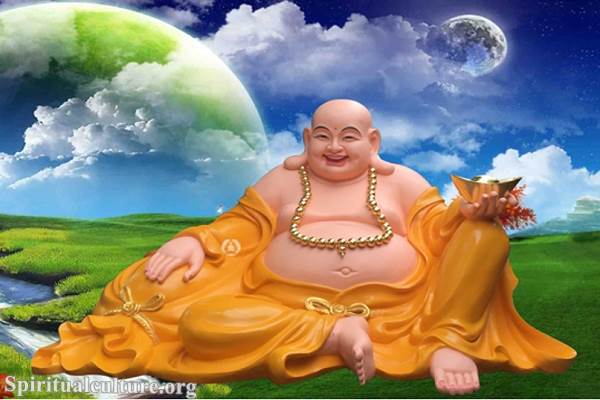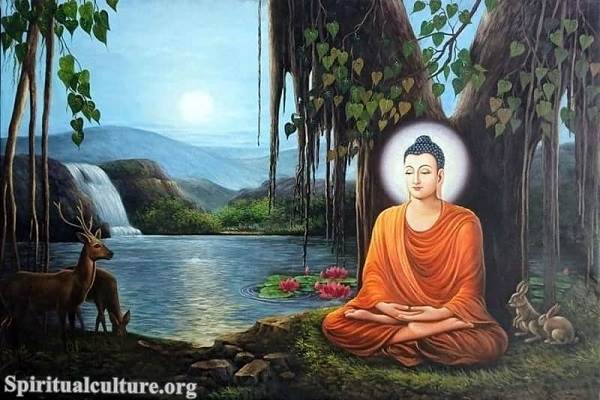In the vast landscape of spiritual traditions, few concepts are as widely referenced — and as commonly misunderstood — as karma. Especially in Buddhism, the term is often flattened into a kind of cosmic scoreboard, where good deeds yield blessings and bad deeds bring suffering. But this overly moralistic lens misses a profound truth: karma is not divine punishment or reward, and it is not interchangeable with the broader law of causality.
As Spiritual Culture, we invite you to pause with us. Let’s enter a space of clarity and compassion to explore the difference between karma and causality in Buddhism — and why this distinction matters, not just philosophically, but spiritually, ethically, and existentially.
This article will explore what karma truly is, how it differs from other kinds of causes and effects, why these distinctions are often blurred, and how understanding the difference can transform how we live, choose, and awaken.
Karma and Causality: Similar Words, Different Worlds
Karma: The Seed of Volition
At its core, karma (Sanskrit: कर्म; Pāli: kamma) means action — but not all action. In the Buddhist context, karma refers specifically to intentional action, particularly mental volition.
As the Buddha says in the Anguttara Nikāya:
“It is volition, monks, that I call karma; for having willed, one acts by body, speech, and mind.” (AN 6.63)
This means karma is not just any cause. It is the cause born of intention — and this is a profound distinction. Only intentional actions create karmic results (vipāka). If you accidentally step on an insect, it does not generate the same karmic imprint as doing so knowingly and indifferently.
Karma as Moral Energy
In this way, karma is ethically charged. It is not mechanical causation, like dropping a rock and watching it fall. Rather, it is psychological and spiritual causation, where the energy of one’s intentions ripple into future consequences, shaping the field of consciousness.
Just as a seed carries the potential of a tree,
so an intention carries the echo of a life.
Causality: The Broader Web
In contrast, causality (hetu–phala in Buddhism; meaning cause and effect) refers to the general law of dependent origination — how all phenomena arise in dependence on conditions.
This principle is famously expressed in the formula of paṭiccasamuppāda (dependent co-arising):
“When this is, that is. With the arising of this, that arises.
When this is not, that is not. With the cessation of this, that ceases.” (SN 12.61)
This is a universal principle. A match causes fire. Clouds cause rain. Thoughts lead to emotions. It is the foundation of how all things — physical, mental, experiential — emerge and dissolve.
Causality Without Karma
Many forms of causality are not karmic. A child born blind due to a genetic condition is not necessarily experiencing karmic retribution. It may simply be a biological cause. Karma may be one of many conditions — but not always the decisive one.
To assume karma is behind every outcome is to misuse Buddhist teaching in a way that can lead to blame, shame, and spiritual confusion.
Common Misconceptions — and Their Consequences
Misconception #1: “Everything That Happens to You Is Because of Karma”
This belief leans dangerously toward fatalism or moral judgment. While karma explains why certain tendencies or life circumstances arise, not everything is karmically determined. Natural laws, environmental conditions, and even the actions of others shape our experience.
Buddhism is not deterministic. It teaches interdependence, not inevitability.
Misconception #2: “Karma Works Like Cosmic Justice”
In truth, karma is not a divine system of rewards and punishments. There is no celestial accountant tallying our deeds. Karma works through psychological continuity — the shaping of the mind and its tendencies through intention.
A person who harbors hatred and acts from it doesn’t get punished — they become a person shaped by hatred. That is karma’s unfolding.
Misconception #3: “Karma Is Instant or Linear”
Often we expect karma to function like immediate justice: “He hurt others, why doesn’t he suffer?” But karma doesn’t operate on human timetables. Its effects may manifest in this life, in future conditions, or subtly in the quality of one’s consciousness.
It’s not a vending machine. It’s a garden of seeds, sprouting in different seasons, nurtured by various causes.
The Buddha’s Subtle Wisdom on Karma
Individual Responsibility Without Blame
The Buddha emphasized personal responsibility — but not in a blaming way. Karma invites self-reflection:
What am I sowing with my thoughts, speech, and actions?
“Whatever one frequently thinks and ponders upon, that will become the inclination of the mind.” (MN 19)
This teaching is empowering, not condemning. It asks us to live with mindfulness, knowing that our moment-to-moment intentions shape our becoming.
Karma Is Not Destiny
Even if past karma ripens as difficulty, we are never bound by it. The present moment holds fresh soil. By planting wise intentions now, we alter the future. This is the heart of Buddhist liberation — freedom through insight, not submission to fate.
Practical Implications: How This Insight Can Transform Us
Cultivating Intentional Awareness
Understanding karma as volition reminds us to live with clarity of motive. What drives our speech? Our choices? Our reactions? This self-inquiry is spiritual practice itself.
Rather than reacting unconsciously, we pause and ask:
- Am I acting from compassion or craving?
- From fear or wisdom?
- From ego or service?
This awareness becomes the field where wholesome karma grows.
Releasing Judgment of Others
When we confuse karma with moralistic causality, we may judge others for their suffering — “They must have deserved it.” This mindset is not only un-Buddhist; it is unkind.
Understanding the complexity of causation helps us respond with compassion instead of condemnation.
Embracing Humility in Mystery
We may never know the full causes behind life’s events. Buddhism does not ask us to speculate endlessly about past lives or cosmic fairness. It asks us to practice wise effort in the here and now — with patience, faith, and compassion.
As the Culakammavibhanga Sutta teaches:
“Not everything is due to karma. Some things are due to climate, to food, to careless behavior, to external causes…”
In this humility, we find spiritual maturity.
Sacred Texts and Their Clarifications
The Buddha’s Words in the Nikāyas
The Buddha clarified the scope and limits of karma many times. In Anguttara Nikāya (AN 4.77), he refuted the belief that everything that happens is due to past actions — calling it a “wrong view.”
He taught a nuanced model that includes:
- Karma (intentional action)
- Biological causes
- Environmental conditions
- Accidental or spontaneous occurrences
Tibetan Buddhism: Karma as Habitual Energy
Tibetan schools often emphasize karma as habitual momentum — a pattern of clinging and aversion that shapes the stream of consciousness. In this view, karma is less about events and more about how we relate to events.
Real-Life Reflection: A Mirror, Not a Gavel
When we understand karma rightly, we stop looking at life through the lens of guilt or punishment. We start looking through the lens of responsible presence.
We realize that:
- Every thought matters.
- Every intention shapes us.
- Every act of love waters peace in the world.
This insight is not theoretical. It is utterly personal. It is the mirror we look into each day — not to judge, but to grow.
What This Means for You
Understanding the distinction between karma and causality is not a matter of philosophy — it’s a path to freedom and responsibility. It helps us:
- Stop blaming ourselves or others for every misfortune.
- Start living with deeper intentionality.
- Stop fearing karma as cosmic punishment.
- Start seeing karma as spiritual opportunity.
As Spiritual Culture, we gently invite you to sit with this truth:
You are not a prisoner of your past.
You are a gardener of your present.
And from this moment forward,
you may plant seeds of liberation.
Karma is not about what happens to you. It’s about who you become — through every thought, every choice, and every breath.
Let us walk that path together, with clarity and compassion.




